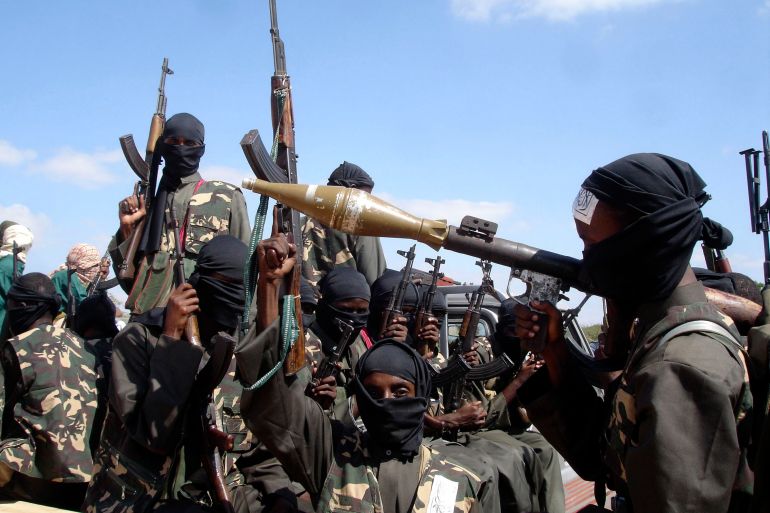Al-Shabab claims deadly car bomb attack in central Somalia
Al-Shabab is claiming responsibility for two car bombs in Hiraan after it was pushed out of the region.

At least 15 people have been killed in two car bomb blasts in central Somalia’s Hiraan region, according to officials and witnesses, with a resident involved in the rescue operations saying the dead included soldiers, militiamen and civilians.
The al-Shabab armed group claimed responsibility for the deadly attack in the town of Mahas on Wednesday. Security officials and local leaders said two military bases were targeted in Mahas.
Keep reading
list of 3 itemsAl-Shabab gunmen attack military base in central Somalia
UN extends Somalia arms embargo amid government dissatisfaction
It is the latest in a string of attacks launched by the al-Qaeda-affiliated group since government forces and allied clan militias pushed out the fighters from the territory they controlled in operations launched last year.
“I have counted 15 dead people including soldiers, militiamen and civilians. Dozens were wounded,” said Abdullahi Osman, a shopkeeper in Mahas town.
“Dozens were wounded. Many houses were destroyed. Fragments of the bombs injured people far from the site. The death toll may rise,” he told Reuters news agency.
There were varying accounts of casualty figures from local militiamen and officials. Al Jazeera could not independently verify the death toll figures.
Mohamed Moalim Adan, a leader of a community militia allied with the government in Mahas, put the toll at 19 in an interview with AFP while Abdikarim Hassan, a traditional elder in Mahas, said “nearly 20 people died in the blasts”.
Another community leader, Mohamud Suleyman, said 52 people were wounded and “most were transported to Mogadishu for treatment”.
In a statement issued after the blasts, the al-Shabab group’s media office said its fighters had detonated explosives at military bases in Mahas and also attacked another base in Dadan ‘Ad, about 17km (10 miles) away, according to SITE.
The statement added that al-Shabab had targeted “apostate militias and soldiers”.
The al-Qaeda affiliate has been waging a rebellion against Somalia’s government since 2007. It was pushed out of Hiraan last year by government forces and allied clan militias known as Macawisley, but has continued to stage attacks.
Mahas District Commissioner Mumin Mohamed Halane told state radio that one bomb targeted his house and the other hit the home of a federal lawmaker, according to Reuters.
Al-Shabab has been under pressure since last August when President Hassan Sheikh Mohamud launched a military offensive shortly after taking office.
“The terrorists, after having [been] defeated, resorted to desperately targeting civilians, but this will not stop the will of the people to continue defeating them,” Osman Nur, a police commander in Mahas, told AFP.
“They have killed innocent civilians in the explosions,” he added.
The government says it has killed hundreds of al-Shabab fighters and recaptured dozens of settlements, although different sides often give conflicting accounts of clashes.
Government forces and Macawisley have received support from United States and African Union troops.
Despite the offensive, al-Shabab remains entrenched in vast swaths of rural central and southern Somalia and carries out frequent attacks, including several in the capital Mogadishu against government installations and hotels.
On October 29, 116 people were killed in the capital in two car bomb explosions at the education ministry, and eight civilians died in a 21-hour hotel siege on November 27.
Al-Shabab’s activities have also restricted deliveries of international aid, compounding the impact of the Horn of Africa’s worst drought in four decades.
As a result of severe food insecurity, several parts of the country are in danger of famine in the coming months, according to the United Nations and other experts.
More than 8 million people face “an unprecedented level of need” after five consecutive failed rainy seasons coupled with high food prices due to supply disruptions caused by Russia’s ongoing war with Ukraine.